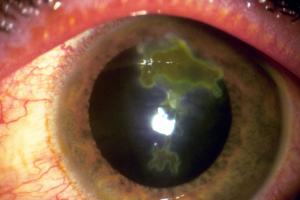Herpes simplex eye infections
Herpes simplex eye infections are a common and potentially serious type of eye infection. They're caused by a virus. It's important to get medical help if you think you may have the infection. Your vision could be at risk if it's not treated.
Symptoms of a herpes simplex eye infection
Herpes simplex eye infections are caused by a virus called herpes simplex – usually the herpes simplex virus type 1 (HSV-1). This virus also causes cold sores.
The clear part of the eye (cornea) can become ulcerated, due to the viral infection. A corneal ulcer is painful, and can cause loss of vision, and even blindness.
Symptoms of a herpes simplex eye infection can include:
- a red eye
- eye pain
- swelling around the eye
- sensitivity to bright light
- a watering eye
- blurred vision

Usually, only one eye is affected, although sometimes both can be.
Where to get medical help
Get medical help as soon as possible if you have the symptoms above. They could be caused by a herpes simplex infection or another eye condition that requires rapid treatment. If you have it, you will need to see an ophthalmologist (an eye specialist) for treatment.
If it's not treated quickly, there's a chance your vision could be affected.
You can get help and advice from:
- your GP or GP out of hours service – they can advise you about services in your area and refer you to an eye specialist (ophthalmologist)
- your nearest emergency department can assess your eye and refer you to an eye specialist (ophthalmologist)
If you wear contact lenses, take them out and don't use them again until you've fully recovered.
Causes of herpes simplex eye infections
Herpes simplex eye infections usually occur when a previous infection with the virus reactivates and spreads to the eye.
Nearly everyone is exposed to the herpes simplex virus during childhood. Most people won't notice this because there are often no symptoms. But afterwards, the virus will stay inactive in the body.
In some people, the virus can be reactivated later on. This can happen randomly or may be triggered by:
- an illness or a high temperature (fever) above 38C (100.4F)
- exposure to strong sunlight or cold wind
- an eye injury
- stress
- periods
- having a weakened immune system – for example, if you have chemotherapy or HIV
Possible complications
Herpes simplex eye infections don't usually cause further problems if they're treated quickly. But about one in five cases are more serious and carry a higher risk of complications.
These can include:
- scarring of your cornea (the front of your eye) – this can cause permanent blurred vision and may require a cornea transplant (an operation to replace the cornea)
- a further eye infection caused by bacteria or fungi
- glaucoma (where the optic nerve, which connects your eye to your brain, becomes damaged)
- permanent vision loss – although the vast majority of people won't experience any significant loss of vision
It's also likely the infection will return at some point. Most people will experience more than one infection, with about one in five having a recurrence within two years.
More useful links
The information on this page has been adapted from original content from the NHS website.
For further information see terms and conditions.